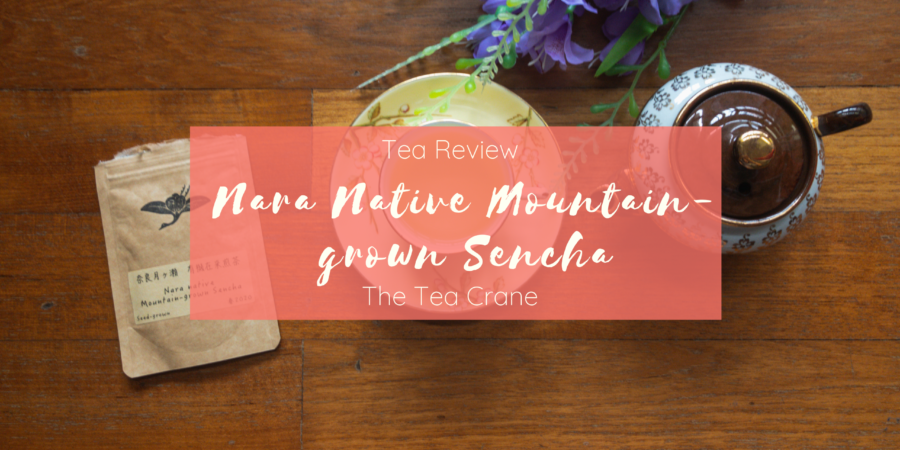I think I’m getting better at finishing opened teas before starting new ones because I finished the Jun Chiyabari Oolong and the Tea & Toast blend before opening this.

The Nara Native Mountain-grown Sencha is one of the teas from The Tea Crane, run by Tyas Sosen (who also wrote The Story of Japanese Tea), and part of the Kickstarter rewards I received. This is the description of the tea on The Tea Crane website:
This tea is a high-quality sencha produced on organic farms, and is therefore both safe and unsullied: free of anything known to be unhealthy, and uncontaminated as to flavor. Consequently, it tastes as sencha really should.
First Impressions

The leaves smell amazing, with a very rich umami scent. As for colour, the leaves are mostly dark green with what looked like some light stalks mixed in. It reminds me a bit of houjicha, in that some of the leaves were lighter than the others. At any rate, it’s a very positive first impressive because I’m a huge fan of umami in sencha.
Tasting Notes
This was a sample packet, which lasted about 3 individual sessions about about 3 to 4 steeps per session (but by the third it felt like it had given all it wanted to give).

The first time I drank this, the water used was probably about 70 degrees celsius (perhaps a bit low for sencha but I wanted to be very sure I wouldn’t over brew it). The first steep produced a very pale green tea liquor that was mild and fresh with distinct vegetal and floral notes. I was pretty surprised that the strong umami smell from the dry leaves did not carry over to the tea liquor, but then I remembered that Tyas believes that the natural state of sencha doesn’t have the umami emphasis most senchas now have and it made sense that a tea he sells and described as “tasting as sencha really should” would not have a strong umami note.
I (belatedly) checked the website to see if there were brewing directions for this after making the tea and found that they recommend a water temperature of 90 degrees! This is definitely not a delicate sencha. For the subsequent sessions I had with this tea, I started with very hot water (definitely above 90 degrees) and was surprised to find that there was no bitterness. In fact, the tea liquor from the first steep was mild with a floral note, pretty similar to when I brewed it with relatively cooler water.

The tea liquor from the second steep is still pretty light, but it’s definitely not mild. The floral note from the first steep is still there, along with vegetal and woody/medicinal notes. The woody/medicinal notes is pretty much what I got with the Korean Dong Cheon Daejak Semi-Wild Green Tea, but lighter and therefore more palatable.

The floral notes are pretty much gone by the third steep – the dominant notes are either vegetal or medicinal. Personally, the tea felt like it had reached the end of its life by this point. I’ve gone up to fourth steeps, but honestly by this cup I’m no longer interested in drinking further.

The spent leaves are interesting – they seem a bit yellower than most sencha, although that could just be me.
Overall thoughts
This was an interesting tea, partly because of the mismatch between the smell of the dry leaves and the taste, and partly because it’s pretty different from a typical sencha. If you’re looking to start getting into sencha and you don’t want to have something with too much umami, I could see this as being a really good choice. Plus, this is an organic tea, which means that it’s kinder towards the environment.

Ooh, looks yummy! I’ve been enjoying a lemony rooibos a friend sent. The package has no directions, so I just guess. I think I don’t have a very discerning palate, though! XD
A lemony rooibos sounds good! I guess a lot when it comes to brewing tea too!
That’s such a pale colour! And the leaves are really light too after the steeping!!
Yes! It’s a really interesting sencha!